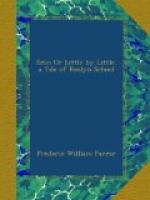The various items of evidence were put together, and certainly they seemed to prove a strong case against Eric. In addition to the probabilities already mentioned, it was found that the ink used was of a violet color, and a peculiar kind, which Eric was known to patronise; and not only so, but the wafers with which the paper had been attached to the board were yellow, and exactly of the same size with some which Eric was said to possess. How the latter facts had been discovered, nobody exactly knew, but they began to be very generally whispered throughout the school.
In short, the almost universal conviction among the boys proclaimed that he was guilty, and many urged him to confess it at once, and save the school from the threatened punishment. But he listened to such suggestions with the most passionate indignation.
“What!” he said, angrily, “tell a wilful lie to blacken my own innocent character? Never!”
The consequence was, they all began to shun him. Eric was put into Coventry. Very few boys in the school still clung to him, and maintained his innocence in spite of appearances, but they were the boys whom he had most loved and valued, and they were most vigorous in his defence. They were Russell, Montagu, Duncan, Owen, and little Wright.
On the evening of the Saturday, Upton had sought out Eric, and said in a very serious tone, “This is a bad business, Williams. I cannot forget how you have been abusing Gordon lately, and though I won’t believe you guilty, yet you ought to explain.”
“What? even you, then suspect me?” said Eric, bursting into proud tears. “Very well. I shan’t condescend to deny it. I won’t speak to you again till you have repented of mistrusting me;” and he resolutely rejected all further overtures on Upton’s part.
He was alone in his misery. Some one, he perceived, had plotted to destroy his character, and he saw too clearly how many causes of suspicion told against him. But it was very bitter to think that the whole school could so readily suppose that he would do a thing which from his soul he abhorred. “No,” he thought, “bad I may be, but I could not have done such a base and cowardly trick.”
Never in his life had he been so wretched. He wandered alone to the rocks, and watched the waves dashing against them with the rising tide. The tumult of the weather seemed to relieve and console the tumult of his heart. He drank in strength and defiance from the roar of the waters, and climbed to their very edge along the rocks, where every fresh, rush of the waves enveloped him in white swirls of angry loam. The look of the green, rough, hungry sea, harmonised with his feelings, and he sat down and stared into it, to find relief from the torment of his thoughts.




